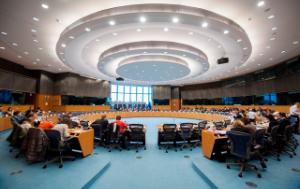Highlights
Upcoming broadcasts
6 October- 9 October: Plenary week
In the week of 9 October, Members' work is centered on Parliament's plenary sitting, and Committees meet only in exceptional cases. During this week, the Committee on International Trade will vote on trade measures for Western Balkans and Digital Trade Agreement with Singapore, and exchange views on Morocco. The Committee on Budgets will vote on its position on the Budget 2026, while the Budgetary Control committee will host the presentation of ECA's Annual Report on the implementation of the EU Budget for 2024. The committee on Economic and Monetary Affairs will hold a Monetary Dialogue with Christine Lagarde, President of the ECB. ECON will also hold a joint scrutiny session with the Committee on the Environment, Climate and Food Safety with Commissioner Albuquerque. The Committee on Constitutional Affairs will examine possible amendments to the European Electoral act. Follow the links below to discover this week's highlights.
- International Trade: Western Balkans, Morocco and Digital Trade Agreement with Singapore
- Budgets: Vote on its position on the Budget 2026
- Budgetary Control: 2024 Commission Discharge – Presentation of ECA's Annual Report
- Economic and Monetary Affairs: Monetary Dialogue with Christine Lagarde, President of the ECB
- ECON-ENVI: a scrutiny session with Commissioner Albuquerque on a delegated act under the EU Taxonomy Regulation
- Constitutional Affairs: Amendment of the European Electoral act

The Fact Sheets on the EU provide an overview of European integration and of Parliament's contribution to that process. They present a brief summary of the EU's institutions and policies, and of Parliament's role in their development. Available in 24 languages, they cover five main areas: how the EU works; economy, science and quality of life; cohesion, growth and jobs; fundamental rights, security and justice; and the EU's external relations. The online version is updated regularly.

The European Parliament’s calendar for 2025 is available through the link below. Parliament decides its annual calendar of work on the basis of a proposal by the Conference of Presidents. It is divided into plenary sittings (part-sessions) and meetings.

Parliament's committees deal with EU legislative proposals by adopting reports, which then are referred to plenary for voting by all Members, and appoint negotiation teams to conduct talks with Council. They adopt non-legislative reports, organise hearings with experts and scrutinise other EU bodies and institutions. Parliament can set up sub-committees and special committees to deal with specific issues. Each committee elects a chair and up to four vice-chairs for a two and a half year mandate.
